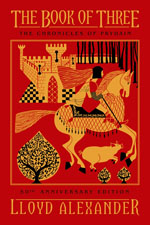Prydain, of course, is just the Welsh name for Britain; you can find it now on any U.K. passport, though Lloyd Alexander did not live to see that. Thanks to Mr. Alexander, the name has acquired a second meaning: it is also the name of a Secondary World, a parish or precinct of Faërie, which serves as the setting for one of the founding texts of modern fantasy. The Book of Three has, I am told, never been out of print since its appearance almost fifty years ago. This fact alone is enough to make many a modern fantasy writer weep with envy. One could, I suspect, fill a very large bookcase with the fantasy trilogies of which Book One was already out of print by the time Book Three appeared. But Prydain remains, partly because the publishers of children’s books are not afraid of their own shadows, and are not too proud to take the profits of a hardy perennial.
My own acquaintance with the fictional Prydain began when I was ten, and read all five of the original books out of the school library; a couple of years later, I acquired my own copies, which went missing in a house-move many years later. Last year, during the enforced idleness that followed upon my fall down stairs, I was delighted to find a complete set of the paperbacks, no longer virginal but still alluring, on a sky-high shelf at a second-hand bookshop within bowshot of my current home. I adopted them and took them home, and packed my bags for a visit to Prydain, to see if the tales retained their charm for an older and more jaded reader, or if they belonged in the vast category of trash that I only enjoyed because I had not yet learnt to tell my good taste from my bad.
I am pleased to report that the books seem as good as they ever did to me, or better. I understand, now, how Alexander produced some of his effects, and where he got some of the odder ingredients for his confection. I still like the same bits I liked as a boy of ten, and dislike most of the bits that left me cold then; but now I can appreciate the ingenuity of the good parts, and at any rate account for the others. I read the books this time with a curious sort of double vision — one eye in childhood, the other in decrepitude, with a lifetime of parallax between them. This gives me a perspective and depth of field, as it were, that would be hard to get in any other way. [Read more…]








Recent Comments